
-
Find the right food for your petTake this quiz to see which food may be the best for your furry friend.Find the right food for your petTake this quiz to see which food may be the best for your furry friend.Health CategoryFeatured products
 Adult 6+ Large Breed Chicken Meal, Barley & Rice Recipe Dog Food
Adult 6+ Large Breed Chicken Meal, Barley & Rice Recipe Dog FoodSupports energy level, joint health, and beautiful coat in large breed mature dogs
Shop Now Puppy Sensitive Stomach & Skin Salmon & Vegetable Stew
Puppy Sensitive Stomach & Skin Salmon & Vegetable StewGentle on stomachs while nourishing skin & supporting development in growing puppies
Shop Now Adult Perfect Weight & Joint Support Chicken & Brown Rice Recipe Dog Food
Adult Perfect Weight & Joint Support Chicken & Brown Rice Recipe Dog FoodThis weight management and mobility support dog food was created with Hill’s unique understanding of the biology of overweight dogs.
Shop NowFeatured products Sensitive Stomach & Skin Chicken & Beef Dinner
Sensitive Stomach & Skin Chicken & Beef DinnerGourmet daily nutrition, carefully made. Tasty chunks with chicken & beef in a decadent gravy. Supports digestive health, nourishes skin and promotes a lustrous fur.
Shop Now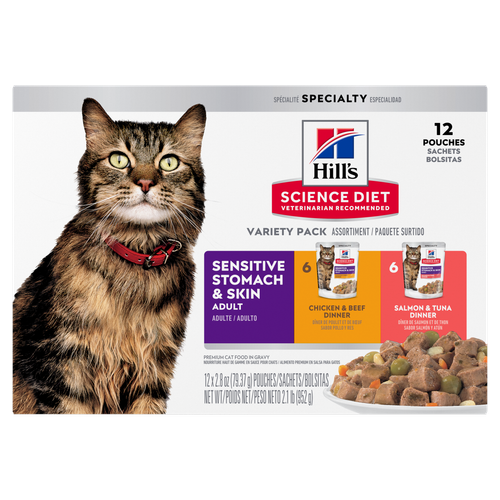 Adult Sensitive Stomach & Skin Pouch Variety Pack Cat Food, Chicken & Beef, Salmon & Tuna
Adult Sensitive Stomach & Skin Pouch Variety Pack Cat Food, Chicken & Beef, Salmon & TunaCarefully made, gourmet daily nutrition. Tasty chunks with Salmon & Tuna in a decadent gravy. Supports digestive health, nourishes skin and promotes a lustrous fur.
Shop Now Adult Perfect Weight Salmon & Vegetable
Adult Perfect Weight Salmon & VegetableOver 70% of cats lost weight within 10 weeks when fed this nutrition
Shop Now -
DogCat
- Cat Tips & Articles
-
Health Category
- Weight
- Skin & Food Sensitivities
- Urinary
- Digestive
- Kidney
- Dental
- Serious Illness
-
Life Stage
- Kitten Nutrition
- Adult Nutrition
Featured articles Water
WaterWater is the most important nutrient of all and essential for life. Animals can lose almost all their fat and half their protein and still survive, but if they lose 15% of their water, it will mean death.
Read More The Right Diet For Your Pet
The Right Diet For Your PetLearn what to look for in healthy pet food & nutrition, including ingredients, quality of the manufacturer, your pet's age, and any special needs they have.
Read More Pet Food Storage Tips
Pet Food Storage TipsWhere you store your cat and dog food can make a big difference in the quality and freshness once it is opened. Here are some common questions and recommendations for optimal storage for all of Hill’s dry and canned cat and dog food.
Read More -


Do cats fart? Although not necessarily the best topic for the dinner table, cat farts are an important topic for pet parents to learn about.
Like other gastrointestinal functions, flatulence is a natural occurrence in animals. Though not as often (or as loudly) as dogs and humans, the dignified cat does, indeed, pass gas.
Why Do Cats Fart?
Flatulence typically results from a buildup of gas in the digestive system, which is then released from the body. In most instances, cat flatulence occurs when your kitty swallows too much air, or it could be related to allergies or food.
Allergies to dust, pollen and pests such as ticks and fleas can also cause digestive distress, including vomiting, flatulence, or diarrhea. Flea allergies are quite common, says the Cat Hospital, but if these symptoms are profuse, you should check with your veterinarian before administering any treatment.
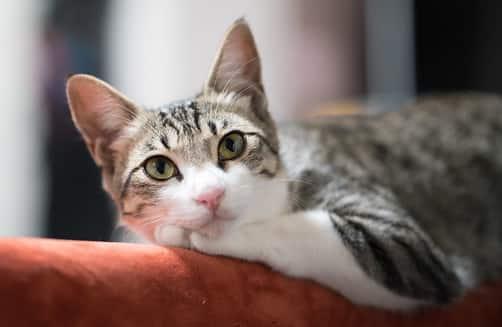
Food allergies or sensitivities can contribute to excessive gas, too. In fact, food is considered one of the main causes of cat farts. In its nutritional guidelines, the World Small Animal Veterinary Association (WSAVA) includes flatulence as an "altered gastrointestinal function" in its global "Nutritional Screening Risk Factor" checklist for veterinarian nutritional assessment. WSAVA's nutritional assessment accounts "for snacks, treats, table food, foods used for medication administration, and dietary supplements" — basically, anything your kitty puts in their tummy.


Tasty Tips
Food and Cat Farts
Choosing the right cat food for your feline friend is a great first step for managing their flatulence. Select a meal plan that includes the necessary vitamins and minerals and fits their size, age and activity level. Fiber, for example, is great for a cat's digestive system, but too much fiber can cause excessive gas. In certain cases, your veterinarian may recommend a therapeutic cat food like Hill's® Prescription Diet® that is specially formulated for proper feline digestion.
Also, cat farts are just one reason that you generally shouldn't give your cat people food. There are some foods, including some fruits, that are safe for cats in moderation, according to the Association of American Feed Control Officials (AAFCO). But consider how an excess of fiber can affect you. Now, think about that happening to your cat. Not good, right?
Though your cat can tolerate some people food, it's best to stick to food that's formulated for your furry friend, as emphasized by AAFCO: "Sharing food from the family table with pets can introduce a nutrition imbalance because pet foods typically offer an entire complete and balanced diet in a single product. In fact, many food items that humans eat are toxic to cats and dogs."
Always contact your vet before feeding people food to your kitty to ensure that it's safe for you to do so.
Flatulence and Health Issues
In rare cases, cat flatulence may be caused by a serious illness such as Tritrichomonasfoetus, an intestinal parasite that can produce gassy, "malodorous" feces, says the North Carolina State College of Veterinary Medicine. If your cat shows other signs of gastrointestinal distress, including excessive diarrhea and vomiting, and their gas has a strong smell, take them to the vet right away so a doctor can check for an underlying health issue.
Rest assured, most cat farts are not a cause for concern. They won't pass gas frequently, and when they do, they'll probably be just as surprised as you are. Cats are elegant creatures; you won't always hear it or smell it, as most gas is odorless — dainty and delicate, just like your cat.
Most of the time, a toot is just a toot. However, if you have any concerns, be sure to talk to your vet. He or she can also make recommendations on a quality food for your cat to ensure that you are properly feeding their digestive health.


Christine O'Brien is a writer, mom, and long-time cat parent whose two Russian Blues rule the house. Her work also appears in Care.com, What to Expect, and Fit Pregnancy, where she writes about pets, pregnancy, and family life. Find and follow her on Instagram and Twitter @brovelliobrien.
Related products

Carefully made, gourmet daily nutrition. Tasty chunks with Salmon & Tuna in a decadent gravy. Supports digestive health, nourishes skin and promotes a lustrous fur.

Over 70% of cats lost weight within 10 weeks when fed this nutrition

Precisely balanced nutrition for indoor cats with the delicious taste of savory minced chicken

Gourmet daily nutrition, carefully made. Tasty chunks with chicken & beef in a decadent gravy. Supports digestive health, nourishes skin and promotes a lustrous fur.
Related articles

Get helpful information on proper feline oral healthcare and why it's so vital to take care of your cat's teeth.
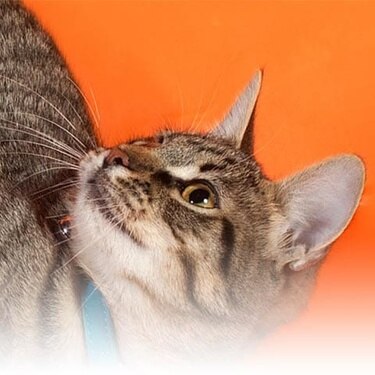
As a responsible pet owner you owe it to yourself and your cat to understand problems associated with overweight cats.
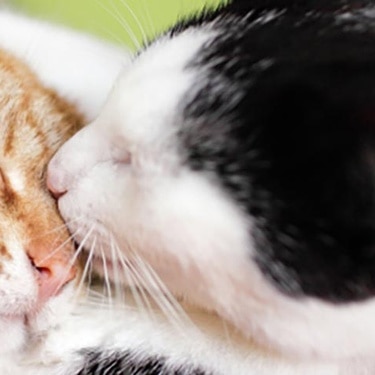
Being overweight puts a cat at risk for developing many serious health issues. Weight gain indicates an increase in body fat and usually results when your cat eats too much and exercises too little.
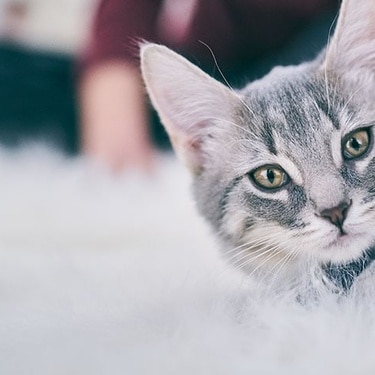
HillsPet Nutrition provides information on proper nutrition, fitness and special needs in keeping your cat healthy and happy.

Put your cat on a diet without them knowing
Our low calorie formula helps you control your cat's weight. It's packed with high-quality protein for building lean muscles, and made with purposeful ingredients for a flavorful, nutritious meal. Clinically proven antioxidants, Vitamin C+E, help promote a healthy immune system.
Put your cat on a diet without them knowing
Our low calorie formula helps you control your cat's weight. It's packed with high-quality protein for building lean muscles, and made with purposeful ingredients for a flavorful, nutritious meal. Clinically proven antioxidants, Vitamin C+E, help promote a healthy immune system.

